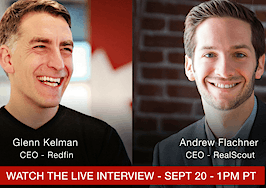Will Facebook have its real estate cake and eat Zillow’s, too?
In what appears to mark a significant shift in the real estate marketing landscape, real estate agents and brokerages are more likely to buy ads on social media than on all other forms of digital media, including listing portals, a new report and Inman data suggest.
The report, which was released by advertising research firm Borrell Associates, suggests that social media advertising is producing a significant return on investment for real estate agents, signaling rising costs for Facebook and LinkedIn products and stiff competition for Zillow Group and realtor.com. (Read more about this in a recent Inman report.)
“Overall, agents are spending $9 of every $10 on digital advertising, and more and more of the spending is going to Facebook and LinkedIn,” Borrell reported.
It forecasted a large migration from “pay-for-listings sites” — which is Borrell’s term for listing portals — “to more sophisticated forms of targeted digital advertising, in both display (banners) and particularly in social media.”
Social media poses increasing threat to portals
Comparing the results of Borrell’s study to a 2014 Inman report suggests that this migration has already progressed significantly over the last three years.
Of all paid lead sources, Facebook ads generally yielded the highest return on investment in 2014, yet agents were only half as likely to buy Facebook ads as they were to invest in listing portal ads, the Inman report found.
Three years later, agents have apparently caught on to the potency of social media marketing and are more likely invest in that medium than in listing portal ads.
“Just as it has grown to challenge the rest of the digital space for all display advertising, social media sites have drawn burgeoning adoption among Realtors as well,” said Borrell Associates’ Kip Cassino, who helped author the report.
Long term, social media sites present a big threat to listing portals, he added.

Social media marketing holds special appeal to the real estate industry. Agents and brokers spend twice as much on social media tools and outside assistance as the average local advertiser, according to Borrell.
Eighty-seven percent of agents and brokers have a social media presence, and of that group, nearly seven out of 10 have “boosted” a post, meaning they have paid to promote a post on their Facebook business page.
In addition, nearly six out of 10 agents with a social media presence purchased targeted social media advertising. This involves paying to promote an ad to a specified audience, such as likely first-time homebuyers, but doesn’t require posting on a business page.
The attraction stems largely from Facebook’s sophisticated ad-targeting capabilities, which allow agents to target ads by categories such as “likely to move” and “first-time buyers.”
“When you consider that Facebook and Instagram can also deliver ads to users by ZIP code and household income, it’s easy to understand the allure to agents and brokers,” the report said.
Adoption versus spending
Superior adoption of social media advertising does not necessarily mean that agents are collectively spending more on social media than on listing portals. Nor does it mean that total advertising spending on listing portals has diminished.
In fact, the advertising business of Zillow Group and realtor.com has grown rapidly in recent years, Borrell notes.
Since Borrell expects agents to spend a total of $2.559 billion on “targeted display” advertising this year — that includes listing portal ads and virtually all social media ads in Borrell’s book — Zillow Group and realtor.com’s collective revenue of $1.5 billion (most of which comes from targeted display ads) suggests that listing portals still receive more agent advertising dollars than social media sites.
It’s also worth keeping in mind that listing portal advertisers appear to spend more generously compared to Facebook advertisers.
Zillow Group advertisers were on pace to spend nearly $6,000 annually for leads from the listing portal in May 2016, the last time Zillow Group reported average advertising spending. Its revenue has grown substantially since then, as the company has focused on selling to deep-pocketed “super agents” while phasing out smaller customers.
By contrast, agents and brokers who buy social media ads spend just under $5,000 on average, according to Borrell’s survey.
Agents are the online marketing early birds
Real estate agents have embraced digital marketing more than perhaps any other type of professional. Of the total ad spending by agents and brokers this year, 87.1 percent is expected to go towards online marketing, up from 84.9 percent in 2016.
In fact, real estate agents and brokers are “the first and, so far, only big advertising category where digital expenditures aren’t continuing in an upward spiral,” Borrell reported.
Spending by agents on digital advertising peaked nearly three years ago and has been flat or slightly down since then, according to the research firm.
Real estate agents and brokers’ total ad spending — on both digital and print advertising — followed the same trajectory, dropping 8.5 percent from 2015 to 2016 to $9.87 billion.
The trend is expected to reverse this year, with Borrell Associates projecting a spending increase of 6.2 percent to $10.48 billion in 2017.
While the report highlights social media momentum, email marketing accounts for the largest share of spending by agents and brokers. Borrell expects them to dish out $3.59 billion on the medium in 2017.
Email marketing spending includes that which is allocated to email marketing systems, such as Constant Contact, as well as agencies that handle email marketing on behalf of agents and brokers.
Targeted display advertising — which Borrell anticipates will grow the most in the coming years — was runner-up among marketing spending categories, projected to account for $2.56 billion in spending in 2017. It covers both social media ads and all listing portal ads other than paid listing promotion. (Most paid listing portal ads are for buyer’s agents, while placing listings on portals is generally free for agents.)
The increase in marketing spending by agents and brokers will be driven almost exclusively by investment in digital advertising channels — social media chief among them, according to Borrell.
Over half (53 percent) of agents and brokers buy social media ads already, Borrell found. The marketing medium trailed only postal mail (77 percent) and newspaper (66 percent), while outranking magazine (48 percent), email marketing (36 percent), search engine marketing (34 percent), display ads (21 percent) and online classified ads (15 percent).

In this particular breakdown, it wasn’t clear which of Borrell’s marketing categories covered ads on listing portals such as realtor.com and Zillow Group. (Borrell Associates didn’t respond when asked.)
But search engine marketing, display ads and online classified ads would seem to be the only candidates, and they all trailed social media ads in popularity.
Facebook’s opportunity
Facebook has said it’s “betting big” on real estate and is focused on designing ad templates that can improve agents’ ROI, even as its ad prices increase, and there appears to be a lot of real estate marketing share up for grabs, especially at the brokerage enterprise level.
Fifty-seven percent of respondents had annual advertising budgets that were less than $10,000. Many of those were probably individual agents. On the other hand, the 29 percent of respondents who reported having budgets between $10,000 and $50,000, and the 14 percent prepared to drop over $50,000, likely included a much higher proportion of brokers that run large brokerages.
On a per-agent/per-broker basis, agents and brokers tend to spend significantly more on other marketing channels, such as newspaper ads, online classified ads and, though least popular, broadcast TV, than the $4,940 they allocate to social media ads.
That could start to shift. Facebook recently rolled out its first custom ad product for real estate companies, and in an example of co-opetition, Zillow Group has begun selling Zillow and agent-branded Facebook ads through a partnership with the social media giant.
Targeted display advertising — which covers both social media marketing and most listing portal ads — is expected to double over the next five years, while online video grows 38 percent, Borrell said. Search engine ads and un-targeted “run of site” banner ads, meanwhile, are likely to become less popular, according to the research firm.
A changing marketing landscape
Three changes will reshape real estate marketing in the years ahead, according to Borrell:
- Seniors are the most lucrative buying segment, “forcing a different focus on marketing”
- Ad targeting “has expanded digital media’s reach beyond active buyers to dreamers and intenders”
- Agents are spending “an extraordinary amount of time and money on marketing tasks”
These trends provide fertile ground for a “market entrant that can simplify marketing tasks and consolidate them with basic office and communications functions” — which is, indeed, is the goal of many existing real estate vendors.
“The real gold mine is in a desktop or mobile app that can manage the data entry/monitoring tasks and spray out post cards, emails, Tweets, banner ads, brochures, and whatever else will help spread the word,” the report said.

And the “biggest short-term opportunity” exists for any entity that can handle marketing on behalf of agents and brokers — 78 percent of which are “novice/apprentice” marketers, rather than experts.
“Real estate professionals are looking for someone to make sense of the myriad of marketing channels, and to manage them in an efficient and cost effective manner,” the report said.
“There’s bound to be a lot of opportunity when the average agent spends $31,817 annually on tools or outside assistance related to social media — as much as they might make in total commission on selling four or five homes.”







